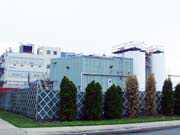One of the last vestiges of formerly industrial Hoboken, the Cognis Corporation, announced Tuesday that it will close its doors in the mile-square city by the third quarter of 2003. According to officials from Cognis, the chemical plant currently employs 62 people. It has been in operation since 1922.
The plant’s scheduled closing has added significance because it represents the last big industrial company to leave Hoboken’s once bustling industrial west side.
The beginning of the century saw an industrial renaissance that brought more than 250 companies to Hoboken. Major industrial giants such as Maxwell House, Standard Brands, Lipton Tea, Hostess Cake, Tootsie Roll, Bethlehem Steel and dozens of smaller specialized companies, including Keuffel & Esser Instrument Co. and Ferguson Propeller, called Hoboken home.
Today, Hoboken has evolved into prominent professional community whose skyrocketing real estate prices and lack of open space for expansion have forced the city’s historic industrial remnants to disappear one by one.
Who they are and what they make
Many long-time Hoboken residents still call the plant at 1301 Jefferson St. Henkel Chemical, after its former owners. The Henkel Group completed the sale and transfer of ownership of its independent chemicals business Cognis on November 30, 2001.
The purchaser was an investor’s consortium of funds advised by Permira, GS Capital Partners and Schroder Ventures Life Sciences.
The Cognis Hoboken Plant produces surfactants used in personal care, household, industrial and institutional industries. Surfactants are substances that, when dissolved in water, reduce the surface tension between it and another liquid. They are used in detergents, soaps, cosmetics, plastics, inks, textiles and a number of other beauty, nutrition, and hygiene products. The surfactants the plant produces are mainly based on renewable raw materials, such as coconut oil and sucrose, according to Cognis officials.
Reasons for the closure
According to a press release, the company is expanding its plant in Kankakee, Ill., which makes the plant in Hoboken superfluous. The press statement said the decision to move operations was multi-faceted According to Joseph Polak, Cognis’ business director, the move will make the company better able to compete in the industry. "The changes will increase the efficiency of Cognis’ North American manufacturing network, and will result in improvements in quality, service and support to customers," said Polak Tuesday.
Another reason for the move is that the residential make-up of the surrounding neighborhood "precluded Cognis from making large-scale investments" in the Hoboken manufacturing site.
According to Louis Gayo, a manufacturing director who has worked at the Hoboken plant since 1988, the very success of Hoboken as a fast growing urban residential community hindered the chemical company’s ability to grow.
"The company recognized [that Hoboken] has a large residential population, which makes opportunities for expansion very limited," said Gayo. "In order to be more competitive the company needs to optimize the manufacturing process and streamline the way it’s organized."
According to Cognis spokesperson Kathy Bollmer, as the company phases down the production levels, some of its employees will leave earlier than the final closing date. She added that no matter when they leave the company’s employ, they will receive severance, counseling and assistance finding new jobs. Some will elect to retire.
Bollmer also said that property will be sold after the transition is complete sometime in the third quarter of next year and that the company is currently undertaking a environmental study to see if any remediation will be needed at the longtime chemical plant.
"The site will be cleaned by a licensed contractor," said Bollmer Thursday. "It will be closed and remediated according to regulations [established by the state] of New Jersey."
Mayor David Roberts said Wednesday that he is sympathetic to those who are going to lose their jobs.
"I definitely feel for those who are losing their jobs, and if they are Hoboken families, we will do what ever we can to help them find new employment opportunities," he said.
But he also said that a chemical plant might not be appropriate for Hoboken’s changing dynamic.
"This type of industry is too risky [for Hoboken]," said Roberts who dislikes the idea of having a chemical facility so close to residential homes. "I hope the city’s planners look at the site and find a cleaner use. I think open space would be appropriate for that area."
